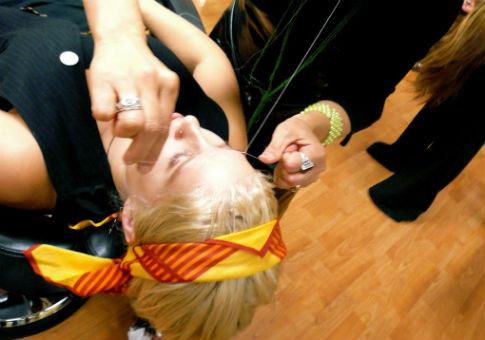The Texas Supreme Court struck down as unconstitutional a costly licensing scheme for eyebrow threaders in a 6-3 ruling on Friday.
Texas regulators determined in 2008 that those involved in eyebrow threading—a hair removal practice popular in South Asian and Middle Eastern countries—to have at least 750 hours of experience to obtain a license to practice commercially, leading a group to sue the state.
"The large number of hours not arguably related to the actual practice of threading, the associated costs of those hours in out-of-pocket expenses, and the delayed employment opportunities while taking the hours makes the number highly relevant to whether the licensing requirements as a whole reach the level of being so burdensome that they are oppressive," Justice Phil Johnson wrote in the majority opinion.
The plaintiffs argued that the licensing regime was unnecessary and onerous. Practicing without a license could lead to fines of $5,000 per day. They argued in a legal brief that the requirements placed "senseless burdens on eyebrow threaders and threading businesses without any actual benefit to public health and safety."
The plaintiffs relied on expert testimony from a trained cosmetician who argued that only 40 of the training hours—those related to sanitation—directly applied to the practice of threading. The 750-hour training regimen, the court noted, also far exceeded more dangerous and complicated cosmetic practices.
"We note in passing that persons licensed to apply eyelash extensions—a specialty involving the use of chemicals and a high rate of adverse reactions—are required to undergo only 320 hours of training," the court said in the ruling. "Approximately 58% of the minimum required training hours are arguably relevant to the activities threaders perform, while 42% of the hours are not."
The court ruled that the licensing regime was too burdensome given the costs of compliance, as well as the penalties of operating while unlicensed. Completing the full 750-hour minimum would cost students between $3,500 and $9,000 for cosmetology courses.
"These individuals were subject to a real threat of likely civil and criminal proceedings, as well as administrative proceedings that could result in penalties and sanctions," the majority ruled. "The fact that threader trainees have to pay for the training and at the same time lose the opportunity to make money actively practicing their trade, leads us to conclude that…the requirement of 750 hours of training to become licensed is not just unreasonable or harsh, but it is so oppressive that it violates Article I, § 19 of the Texas Constitution."
The Texas Department of Licensing and Regulation argued that it was within its right to apply existing cosmetological licensing statutes passed by the state legislature to eyebrow threaders. The three dissenting judges led by Chief Justice Nathan Hecht, a Republican appointee, conceded that "the Threaders deserve to have the yoke of the regulatory state thrown off," but said that the majority undermined the legislative process by revoking the licensing requirements.
"Whether eyebrow threaders need 750 hours’ training, or only 430, or 40, or 1, to practice their trade on the public is not for us to say, as long as the Legislature, whose job it is to say, is making a rational effort to protect public health and safety," the dissent said.
The eyebrow threaders brought the case to court with legal assistance from the Institute for Justice (IJ), a free market public interest law firm. Wesley Hottot, an attorney with the institute, hailed the "landmark" decision.
"The Court held that the government cannot mindlessly meddle in a person’s right to benefit from his or her own labor. Texans cannot be made to endure useless training programs for occupations—like eyebrow threading—that don’t pose any real-world dangers," he said. "We are overjoyed for our clients, who, after seven years of uncertainty, can finally go back to work."
The state supreme court’s decision reversed two lower courts that upheld the state regulations.
